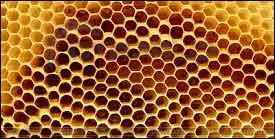How to kill beesLees gerus hierdie bladsy in Afrikaans Most people are not bothered by the presence of insects, not even bees until they get stung and then they would prefer to see the bee killed. Bees however will not sting unless provoked. Certain noises and colours and even the waving about of your hand trying to shoo the bee away can result in the bee feeling threatened and cause it to sting you. Bee's stings have tiny barbs on them which cause them to stay behind in your skin when you get stung. Unfortunately for the bee the sting is attached to a venom sac which stays behind with the sting, effectively killing the bee. 
Bees play an incredibly large role in nature. Plants need to be fertilised through pollinisation and bees do more than a third of this through their foraging visits. A phenomenon known as Colony Collapse Disorder describes the disappearance of entire colonies of bees from their hives or when a hive is opened the entir bee colony is dead. There is no definite indication of what is killing the bees except that it is happening, and happening in large enough numbers to be cause for alarm. If the bee population of the world continues to drop we may find ourselves with a food shortage because the crops are not getting pollinated. This alone is enough reason to do our utmost to keep bees alive and also because we know that killing a bee for doing what comes naturally is just not the right thing to do. Save yourself from getting stung and do a good deed that has a huge
pay-off; call us to remove the bees. Call now on 083 263 1311The argument around urban beekeepingIt seems that the bee population around the world is continuing to dwindle despite the gallant efforts of different communities, from farmers to scientists. A few of the culprits which contribute toward the demise of a hive have been identified and measures to keep them in check are in place and relatively effective. As research into the various causes of the colony collapse disorder continues new contributors to the situation are constantly being brought to light. Still seen as a way to help beef up the dwindling numbers, urban beekeeping and dedicated beekeepers are doing their bit and making bees welcome, despite the contradicting stances of individuals, city by-laws and the scientific community. One of the main arguments against bee keeping in urban areas is the ever present threat of swarming and possible attacks by bees. Teams of researchers studying bee keeping in urban settings have discovered that bees often migrate in their swarms from the intended hive to another location for one of a variety of reasons including:
The result of these swarms moving is either one of panic in the streets as the swarm relocates and more often than not the swarm makes a new home for its self in a nearby garden or shed, or even in the roof of a house. Although keeping the bees alive and housed is a positive way to contribute towards their preservation they are not really where they are needed most. A very high percentage of all food we eat relies on bees for pollination. This food is not grown to any large scale in urban areas. Which begs the question: Is keeping bees in your backyard really having any impact on the dwindling numbers where it matters? As a bee removal team we can be considered the bee rescue squad. We are dedicated to removing bees from where they are not wanted and placing them on a farm or with professional beekeepers. In doing this we are not only saving the bees from being exterminated we also ensure that the bees have access to enough food and if they are on a farm or similar setting they contribute to the pollination of the crops. We will be there ASAP!!!!!!!!!!!! Last updated 7 July 2015 |
|
| Buzz Bee Removals 083 263 1311 (branches throughout South Africa) |
|
